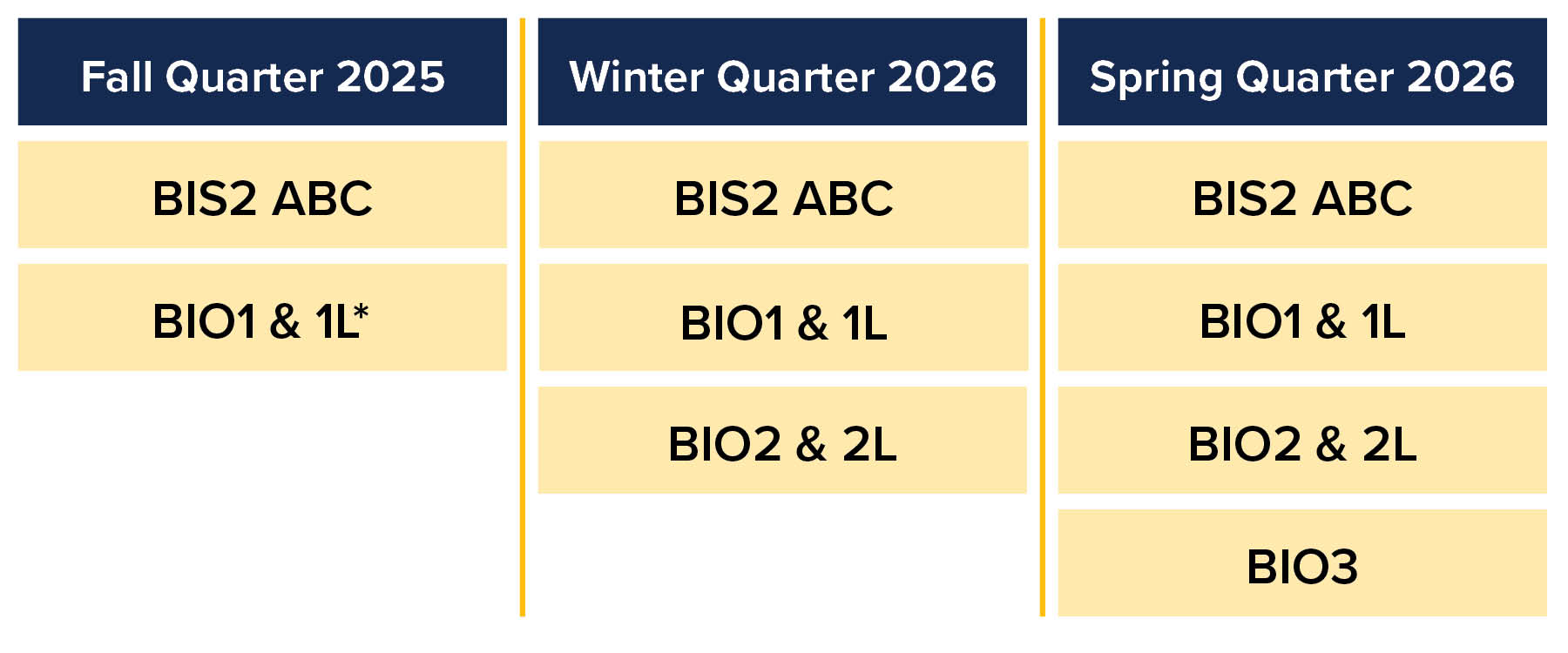BIO123 Information for Students
What's Changing
The BIO123 Series curriculum is designed to enhance student learning through an integrated and conceptual approach. The updated structure emphasizes hands-on experiences, problem-solving, and real-world applications, fostering deeper engagement with the life sciences. Some of the most notable changes include:
BIO123 Lectures
- Creation of a sequenced, 12-unit lecture series:
- Each course has 3 hours of lecture with a small (24-person) discussion section to support student learning.
Sequencing of the courses will allow for improved student success as study skills and topics mastered in one course can be built on in subsequent courses. Topical themes can be connected and reinforced across the sequence, connecting to practical problems such as climate change, human health, and biodiversity conservation and ecosystem management.
BIO 1L and 2L
- Creation of a sequenced lab series that can be taken concurrently with BIO1 and BIO2 (2 additional units):
- These courses have hands-on, hypothesis-driven, inquiry-based laboratory activities that meet 2.5 hours/week.
- Their goal is to grow a student’s scientific mindset and build a more intuitive understanding of the molecular and biological world, and to enhance their ability to formulate and test hypotheses using current techniques in molecular and cellular biology, ecology, evolution and biodiversity.
Recommendation if You Need a Full Year of Intro. Bio.
For majors that require a full year of introductory biology, we recommend that students take all five courses in the BIO123 Series, including BIO1, 2, 3 and both BIO1L and 2L, totaling 14 units. Alternatively, the new structure allows departments to require the BIO1, 2, and 3 lecture courses without the BIO1L and 2L lab courses, affording two units of flexibility for major-specific instruction.
Equivalency Guidelines for the BIS2 and BIO123 Series
For CBS students who have already started the BIS 2 series, it will be available for the 2025-2026 academic year. Please plan to complete the BIS 2 series if you have taken any course in the series.
For students outside of the College of Biological Sciences, we recommend that you connect your major advisors to identify whether the BIS 2 series or the BIO series is appropriate.
BIO123 Series Rollout Timeline
As UC Davis begins rolling out the new BIO123 Series in Fall 2025, starting with BIO1 and 1L*, the current BIS2 series (BIS2A, BIS2B, BIS2C) will continue to be offered every quarter during the 25-26 Academic Year (Fall, Winter, and Spring).
Starting in Fall 2026, the entire BIO123 Series will be offered each quarter.

*In fall 2025, BIO1 and 1L will be open only to incoming CBS freshmen during first pass. If you have questions, please contact your major's academic advisor.
For Students in the BIS2 Series
The best option for students who have started the BIS2 series is to complete the BIS2 series. However, we recognize some students may need to substitute BIS2 courses with those in the BIO123 Series. Please work with your major advisor to determine which substitutions meet your individual needs.
Attention students: you must get approval from your major's academic advisor before making any course substitutions to the BIS2 series.
Additional FAQs
- Why are we making these changes now?
- The new course series enhances small-group discussions, hands-on labs, and active learning to better prepare students for upper-division coursework. By focusing on core concepts and practical skills, the updated series allows for greater mastery and retention while maintaining a strong foundation in biological sciences.
- How does the structure of the BIO123 Series compare to that of the BIS2ABC series?
- The new BIO123 Series must be taken in sequence and separates lectures and labs into standalone courses (e.g., BIO1 and 1L). Lecture courses are now 4 units (3 units of lecture, 1 unit of discussion), while labs are optional 1-unit courses which can be taken concurrently with the lectures. This structure facilitates small-group discussions, active learning, and scheduling flexibility while reducing the overall series by 1 unit.
- What about BIS2C, Introduction to Biology: Biodiversity and the Tree of Life?
- Key topics from BIS2C are distributed across the series. BIO1 covers the basics of phylogenies and major evolutionary innovations. BIO2 addresses the evolution of unicellular life and distinctions among bacteria, archaea, and eukarya. BIO3 highlights functional biology and adaptations in multicellular organisms (plants and animals) without systematically covering all organismal diversity. A broad survey of the diversity of life will still be available in the new 3-unit BIS 070 lecture course (Biodiversity and the Tree of Life), which will be offered after BIS2C is discontinued.
- How do I know if a course has BIS2A, BIS2B or BIS2C as a prerequisite?
- To see if a BIS2 series course is a prerequisite for one of your courses, review the ICMS impact report for each respective course. This report will also indicate which majors and minors have these courses listed under program requirements.
BIS02A Impact Report
BIS02B Impact Report
BIS02C Impact Report - How will these changes influence prerequisites for upper-division courses?
- Departments will determine which of BIO1, BIO2, or BIO3 align with their course prerequisites. For courses that previously required BIS2ABC or a full-year biology introduction, the BIO123 Series is recommended. Departments looking for broader coverage of organismal diversity across all life should consider requiring BIO70.
- How will the new series articulate with community college biology courses?
- In the short term, community college courses will continue to articulate into the BIS2ABC series. Over the next two years, CBS will work with community colleges to develop new articulation agreements for the BIO123 Series. In the longer term, the BIO123 Series is expected to articulate more easily with most community college courses than the current BIS2ABC series.
